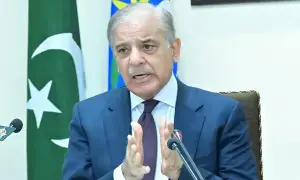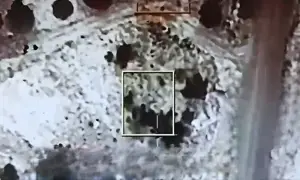Rao Anwar acquitted in Naqeebullah Mehsud murder case
4 min readAn Anti-Terrorism Court in Karachi has delivered a verdict in the Naqeebullah murder case — exactly five years since the young Pashtun man was killed allegedly by police officers on the city’s outskirts. The Naqeebullah case was iconic for starting the conversation on extra-judicial murders as a form of policing in the mega-city.
The court acquitted the prime suspect former SSP Rao Anwar and 17 other accused in the case.
The court ruled that the prosecution failed to prove its case beyond doubt.
Rao Anwar lauded the court verdict saying he was implicated in a “false case.” He also hurled fresh allegations at Naqeebullah and demanded his police job back.
A detailed judgment is expected shortly, reported Shahmir Khan.
Security was beefed up at the court premises and even reporters were not allowed in.
The court was originally expected to release the verdict in the first half of the day but it was delayed until 3:15pm.

Anwar and other police officers accused of the murder, including DSP Qamar, arrived at the court Monday morning. A total of 22 people –mostly police officials — were indicted in the case and the court acquitted 18 of them.
The verdict on the remaining accused who were still at large will be given after their arrest, the court said.
‘Naqeebullah was innocent’
Before handing down the verdict, the judge said that it was proved that Naqeebullah was abducted and then killed at the crime scene.
The court also said that since the FIR registered against Naqeebullah under terror charges had been categorized as “Class C” it is proved that he was innocent.
A “C” class summary report for an FIR is issued by the police when a criminal case is filed due to a mistake.
However, the court said that it had reviewed the matter on legal and technical grounds and the prosecution could not prove beyond doubt that the suspects charged in the case were involved in the murder.
Gibran Nasir, who was on the legal team representing Naqeebullah Mehsud’s side, said that the verdict would be challenged before the Sindh High Court.
Anwar and others were indicted in the case on March 25, 2019, when they refused to plead guilty.
The prosecution produced 60 witnesses against the suspects in the case.
After lawyers completed their arguments, the court reserved its verdict on January 14 this month.
Petition against bail withdrawn
During the course of the hearing, all suspects were released on bail.
Naqeebullah Mehsud’s father Mohammad Khan Mehsud had challenged this in the Sindh High Court. The elder Mehsud died of a heart attack in December 2019.
His petition was withdrawn on Monday by the lawyer on account that the ATC had completed the hearing. The Sindh High Court closed the proceedings on the petition against the bail.
Five-year quest for justice
Naqeebullah Mehsud was killed on January 13, 2018, on the outskirts of Karachi after allegedly being abducted.
In March 2018, the Supreme Court of Pakistan ordered the arrest of Rao Anwar, the prime suspect. The SSP was arrested from the Supreme Court of Pakistan premises after making a dramatic court appearance.
He was released on bail in July 2018, only four months after the arrest, though the SSP was not allowed to resume his office.
In April 2018 then-Chief of Army Staff General Qamar Javed Bajwa assured Naqeebullah’s father of justice.
The murder of Naqeebullah and three other men who were killed with him sparked a debate about extrajudicial killings in Pakistan. The deaths also sparked widespread protest in the country and Pashtun Tahafuz Movement (PTM) was launched to seek justice for Naqeebullah.
Hardly a shock: Zoha Waseem
Dr Zoha Waseem, whose recently published book Insecure Guardians: Enforcement, Encounters and Everyday Policing in Postcolonial Karachi opens with the Naqeebullah case, was initially shocked when she heard the news.

“Initially I think I was surprised and shocked it was a clear-cut acquittal and there was nothing more to it,” she told Aaj News over Zoom shortly after the verdict Monday. “It was such a high-profile case. It got so much international attention. It generated a social movement. But after a few moments, I wasn’t that surprised. It’s been five years since this has been going on. The anger that it generated has perhaps lost momentum.”
So much that goes on in the anti-terrorism courts is just not that transparent, she said. Pakistan has a history of similar high-profile cases (Murtaza Bhutto being perhaps the most-cited). “So when you consider the context and weaknesses, the failures of the criminal justice system at large, then perhaps it’s not such a shocker,” she said.
Between 2013 and 2018, in the Karachi operation 2,000 people were killed. It was no secret that encounter killings were happening. Four years later the Naqeebullah killing became scandalous for the police and drew national and international anger. This is when the public conversation started on encounter killings began, said Waseem. “There has been tolerance if not demand for extrajudicial practices on the part of the police,” she argues. “And it also shows how violence is central to police and policing and the culture of policing in Pakistan and South Asia where encounter killings are glorified if not normalised. It had to take a high-profile killing to start questioning it.”
For the latest news, follow us on Twitter @Aaj_Urdu. We are also on Facebook, Instagram and YouTube.























Comments are closed on this story.